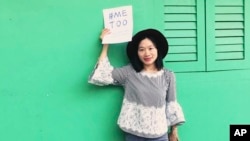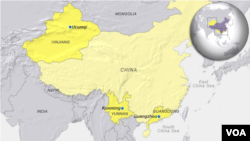A court in the southern Chinese city of Guangzhou on Friday sentenced Chinese independent journalist Huang Xueqin and labor rights activist Wang Jianbing to five years and three years and six months in jail respectively for "inciting subversion of state power."
Huang said she would appeal the sentence in court, according to information shared by Free Huang Xueqin & Wang Jianbing, an online support group for the two.
Chinese authorities have strictly controlled information on this case so the media and human rights organization rely on information shared by supporters to report on the verdict.
Authorities, before the trial, set up metal barriers and deployed a huge police presence around the court to keep journalists and the public from entering the court, the group said.
According to details of the verdict shared by the online support group, Huang will be in jail until September 18, 2026, while Wang will finish his sentence on March 18, 2025. Authorities confiscated several computers, mobile phones, and hard drives that belong to Huang and Wang.
Some analysts say Friday’s verdict shows the Chinese government’s attempt to outlaw social activism by applying criminal charges with heavier penalties to activities that do not directly challenge government authority.
"This case shows that Beijing now considers training in nonviolent protest as an act of subversion of state power, which is incredibly worrying," Sarah Brooks, Amnesty International’s China director, told VOA by phone.
While China used to impose criminal charges with long sentences on human rights lawyers before 2020, Brooks said Beijing is now targeting lower-profile activists with similar charges.
"Authorities used to target activists like Huang and Wang with charges like ‘picking quarrels and provoking trouble,’ [which carries a shorter prison sentence,] but now their activism could be viewed as national security crimes," she said.
In response to human rights groups’ criticism, the Chinese Embassy in the Washington said China is a country of rule of law and the right to a fair trial is "well maintained" in the country.
"Any attempt to smear China and interfere with China’s internal affairs in the name of human rights will not succeed," embassy spokesperson Liu Pengyu told VOA in a written response.
Friday’s verdict comes nearly 1,000 days after Huang and Wang were imprisoned on the charges of inciting subversion of state power. It also follows repeated expressions of concern about Huang and Wang’s health condition by some of their friends.
"Wang has a long history of depression while Huang suffered from weight loss, persistent back pain, and her menstruation had stopped," said a friend who requested anonymity due to fears of facing government retaliation.
Since authorities have prevented their lawyers from sharing information about the case with the public, the anonymous friend told VOA there has been very little update about Huang and Wang’s health conditions in jail.
In addition to shrouding the trial in secrecy, the friend, who is familiar with the case, said Guangzhou authorities tried to "justify" the charges they imposed on Huang and Wang by questioning 70 people connected to them.
"During the first six months following their arrests, the police tried to fabricate evidence that could justify the charges they used against Huang and Wang by interrogating 70 people related to them," one activist with knowledge of the case, who requested anonymity due to fear of retribution, told VOA by phone.
According to a copy of the official indictment shared by Huang and Wang’s supporters on X, formerly known as Twitter, Guangzhou authorities accused the two of publishing "seditious content" aimed at inciting subversion of state power on foreign social media platforms.
They also claimed that Huang and Wang participated in and organized a series of "online courses" as well as private gatherings to "increase participants’ dissatisfaction" toward the Chinese government.
Huang and Wang’s friend said Wang was hoping to reestablish social networks for activists focusing on different issues because the Chinese government intensified crackdowns on different sectors of China’s civil society since 2015, forcing many activists to become isolated.
"Wang’s efforts increased the Chinese government’s concern that these social networks could create challenges to political stability in China," the friend told VOA, adding that Wang and Huang’s involvement in the labor rights movement and #MeToo movement made them the targets of Beijing’s crackdown.
At the height of China’s #MeToo movement in 2018, Huang set up a social media platform for victims to report sexual harassment cases. She also released surveys concluding that sexual harassment was a serious problem at universities and workplaces.
In October 2019, she was arrested and detained for several months after joining the protest in Hong Kong and shared her observations in an online article. For his part, Wang has been advocating for the rights of workers and those with disabilities since 2014.
Some analysts say details of the case reflect the Chinese government’s efforts to crack down on private gatherings held by dissidents in recent years.
Apart from Huang and Wang, Chinese human rights lawyers Ding Jiaxi and Xu Zhiyong were arrested and sentenced to more than 10 years in prison for organizing a private gathering for dissidents in the coastal city of Xiamen in December 2019.
The Chinese government is trying to decimate any kind of civil society activities, including private gatherings at dissidents’ homes," Yaqiu Wang, research director for China, Hong Kong and Taiwan at Freedom House, told VOA by phone.
In addition to collecting evidence to justify the charges against Huang and Wang, Brooks said the Chinese authorities are also trying to have a chilling effect on other activists by summoning them for questioning.
"The government is warning these activists that they should be careful about who they decide to be friends with," she said, adding that the message will cause human rights activism to "break down."
Huang and Wang’s friend said Chinese authorities’ intimidation campaign against other activists has deterred them from continuing their activism. "The whole civil society has become less organized and more vulnerable," he told VOA.
Despite the Chinese government’s attempt to deter activism in civil society, Brooks said some activists are still trying to continue work in sectors such as women’s rights and human trafficking.

